Участник:RustingWithYou/Sandbox 1
| Unathi Lore Pages | ||
|---|---|---|
| Planets and Systems | Moghes · Ouerea · Uueoa-Esa · Notable Unathi Colonies · Gakal'zaal · Tret | |
| Factions | Izweski Hegemony · Unathi Guilds · Unathi Piracy · K'lax in the Izweski Nation · The Queendom of Sezk-Hakh · Free City of Vezdukh · Unathi in Dominia | |
| History | Unathi History · Contact War · Unathi Recent Events · Notable Unathi | |
| Religions | Sk'akh · Th'akh · Aut'akh · Si'akh | |
| Society and Culture | Unathi Entertainment · Unathi Honor · Unathi Military Structure · Unathi Crime And Enforcement · Unathi Educational Institutions · Unathi Spaceflight · Unathi Abroad · Zandiziite Games | |
| Regions of Moghes | Izweski Heartland · Tza Prairie · Southlands · Broken Coalition · Torn Cities · Zazalai Mountains · The Wasteland | |
| Lore Arcs | The Titan Rises Arc | |
Overview
The Wasteland is an unforgiving place, as the name implies. Many inhabitants, the survivors of the Contact War, attempt to make a livelihood here. Their reasons for doing so varies: Be it religious, familial ties, or lawbound exile. Here are a few examples of clans that live in the wasteland and how they fare with the harsh life outside of the terraformed areas, the Hegemony controlled territories, and the relative safety of the Untouched Lands.
One of the reasons most members of the Clans leave their villages is to have a steady supply of credits for their family back home - for medicine, food, and water. Those who make it out of the Wasteland are lucky to be out, but not everyone has the funds to pay for a smuggler to get them past the Izweski navy.
Life in the Wastes
Living in the wasteland is no easy feat. Many who try, fail. Others waste away, barely something one can call living. However, a precious few manage to overcome all odds, subjugating what many believed to be the end of all Sinta into something with purpose. Through iron will and steel blade, they set forth into the irradiated deserts in an attempt to reclaim what is rightfully theirs.

Quality of life differs from settlement to settlement, some thrive upon the hidden riches uncovered below the sands, while others wither and decay as trade routes get intercepted and resources run low. Communication between the settlements are often rudimentary, use of smoke signals, coloured balloons raised into the air (raised green means good, raised red means bad, and so forth), and in some lucky cases, salvaged pre-war radio equipment.
A majority of Unathi who find themselves stranded here are the remnants of the Traditionalist coalition. While they found themselves at odds with the Izweski Hegemony in the past, they realize that they have been beat, and simply cannot survive without some support from those within the Untouched Lands. Many still bear resentment and even anger towards the Hegemony and those that swear fealty to it. Still, trade is conducted to make ends meet.
A few settlements dotted around the area have received help from Hephaestus Industries to set up educational centres, capable of teaching hatchlings the way the galaxy works, in an attempt to recruit as many of them into the company when they reach adulthood. The Interstellar Aid Corps (IAC) has established hospitals and learning centres in a small number of the larger established colonies.
For the disillusioned few, those that fell out of the learning centres, or those that simply were too barbaric to live in the establish settlements, a criminal underground was established. These secret networks distribute spoofed space traffic codes, as well as transport into different star systems, in exchange for servitude for a set amount of years, a great debt, or a single, dangerous task.
Surviving Kingdoms on Moghes
Despite the destruction of most of the known world from the Contact War, some desperate survivors managed to weather the storm and remain nominally free of Izweski dominance - either from the Izweski's weariness for war on Moghes, or arrogant indifference. These are the remains of the crumbling kingdoms that once fought against, or for the Izweski's dominion, and simply can fight no longer.
While the Izweski are reclaiming the Wasteland, they are ruthlessly uprooting and displacing local cultures in the remaining habitable lands. The Outposts were small, fertile enclaves that survived the Contact War surrounded by the Wasteland. Starting in 2461, Not'zar pushed forward terraforming efforts to expand these green yet hostile oasis.
Queendom of Szek’Hakh
- "Refuse To Break" - Szek'Hakh clan motto, before the war
A matriarchal region of roughly twenty thousand set in the Wasteland, led by the elderly Queen Lazak Szek'Hakh and her daughters. In her settlement and a large portion of the region surrounding it, her clan has become the protector of her region known as the 'Queendom'. More information about the Queendom can be found here
The Reclaimers
Clans of Unathi paid to scavenge the wastes in search of pre-war technology. They’re typically trained for combat, though there will of course be engineers and people who care for cargo, as well as scientists capable of operating and reactivating the technology. Known by the inhabitants of the wasteland as “Rustboys”.
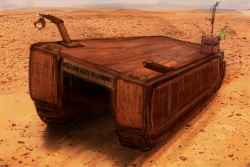
They operate as Unathi usually would, having the Moghean version of a nuclear family. Gender roles are enforced as normal. The men being the preferred sharpshooters, gunners, and pilots. Women act as cooks, medics and caretakers of the young. Both men and women share some jobs, such as cleaning, repairing the landcrawler, and delivering resources around the craft.
They operate out of landcrawlers, massive mechanical beasts of burden that use treads to move across the wasteland. These vehicles are so massive they’re capable of supporting the entire clan living in them for months at a time. Realistically they only need to refuel it, but the wasteland wears down on both the people and the vehicles they use, creating a need for them to head back home and repair.
Some wealthy clans have upgraded their landcrawlers with a massive steam catapult on top, capable of launching planes that are used to scout the wastes; spotting dangers, loot and Punished bases. These are usually crewed by two men, a pilot and a spotter/gunner. Some may carry bombs, but these are seen as barbaric and damaging to the loot.
When they find something they can salvage, or some wastelanders attempt to attack them, they deploy smaller but highly advanced sandrovers. These vehicles are fast enough to catch up to any threat, as well as chase down in-use pre-war tech, and disable it.
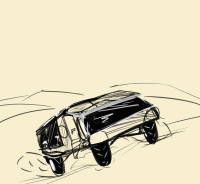
These clans aren’t particularly pious, having a more pragmatic and materialistic view on things in general. As long as you didn’t jeopardize the operation, you were free to call the landcrawler your home.
Due to the work they do, they’re well liked by the nobles, who hire them as mercenaries of war on occasion. They also serve as escorts and guides for traveling nobles, protecting them from the horrors of the wasteland.
Clan "Gawgaryn" - The Punished Clans
- "There is nothing left. The Ancestors weep as they beg us to leave Moghes. No more children will grow up in our Ancestral Homelands the same as we have, ever again." - The words of 'The Lost Son' while visiting the ransacked capital of the Azarak Kingdom - the losing side in the Contact War.
A mega-clan forced to attack others during the war, or risk starvation and total annihilation. They were supposed to receive the capital punishment, but fled to the wastes to escape this. Now they roam the wasteland, having become exactly what they wanted to escape in the past, bandits who loot and pillage to make a living.
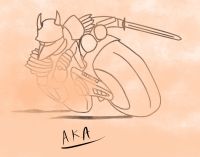
They are rumoured to have an overseeing leader, 'The Lost Son' as he is known, refuses to go by his original name, and only has that title to identify him. He leads the Punished Clans, simply so that they can survive. His only goal is the survival of his clan, and his people, and he's even resorted to kidnapping Unathi and forcing them onto ships outbound to other systems keep them alive, even if they wish to remain by his side and defend him.
The act of being exiled and cut off from the rest of the unathi society has left them worse for wear. So much as mentioning “The Exile Event” will get one beaten to a pulp and even killed, if the crowd was enraged enough. Still, the Clan Father sends two sinta to the Hegemon territory annually, willing or not, to ask for forgiveness. These always get turned around at the city gates and cannot return home, as this will surely lead to their death.
The Punished don’t care much for gender roles, their situation is too dire to segment their workforce. A sinta is obligated to pull their weight despite gender, and in the worst of times, despite age.
There are hidden bases scattered throughout the wasteland, acting as pit stops to rest and recover from raiding, more so than bases of operation. Permanence is a last resort, as staying in one area will get them bombed out, or worse, captured and forced to face their crimes. There are rumours spreading through the Hegemony that there exists a primary base, where Clanfather Kuma’Gizz lives and coordinates the raiding missions.
The largest raid ever performed have been the thefts of Solarian trade shuttles that were landed at an Izweski wasteland camp - the Gawgaryn boarders forced the human pilots to pick up hundreds of Unathi and help them escape to the Frontier and beyond - many of these clans eventually finding homes in Tau Ceti seeking legal asylum. The five Gawgaryn warriors in charge of the raid were not given asylum by Tau Ceti, and instead were given to the Izweski. They were later executed publicly.
These five Gawgaryn warriors are forever worshiped by the Unathi that were able to escape, as heroes.
The Spirits of the Oasis
Unathi who just try to make a living in the wasteland. They live in a state of symbiosis with the Dionae, which clears the radiation from their crops. They are agricultural experts, capable of farming even in the wastes. The food produced from these are used to feed both themselves and their animal companions.
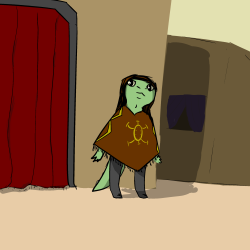
The larger villages plant huge swathes of dionae pods, which either get used to absorb the radiation in the surrounding area, or sent to new settlements to give them a headstart on the minute terraforming procedures. The more land that gets terraformed, the more crops get planted, the more biomass the dionae have available.
They have an attachment to their animals and the dionae, who they regard as pets up until a gestalt forms, who they then regard as fully fledged members of the clan.
Owing to their static lives and traditionalist nature, they have rigid gender roles. The women tend to the crops and animals, and prepare the food. The men deal in commerce, do hard manual labour, such as mining or building, or train to become warriors skilled enough to defend their village from Punished raiders.
Chiefly, they follow the Th’akh religion, though some among them may have different opinions, or even dip into Sk’akhism. There is a firm belief among them that the ancestors wish for them to reclaim the land, and return what was once theirs to its original, beautiful form.
Oasis Clans
While players are in no way obligated to play these clans, and are more than welcome to homebrew their own, these clans are known and settled in the wasteland. Choosing to play one of these will allow you to play out their quirks, as well as meet other clanmembers on-station.
Clan Dorviza - The Dryads
"Is something the matter?"
This clan is considered to be Moghes’ leading experts in regards to all things flora. Their ability to twist a plant’s use to fit their own needs is unparalleled. Many times, the injured are brought to the Dorviza, where their unique traditional herbal treatments are used to heal the wounded.
The Punished frequently raid their settlements to get their hands on medical supplies. Often, these raids are fought off by a mixture of Dorviza forces and Reclaimer mercenaries who protect the Dorviza in exchange for discounted medical treatment.
Unathi from clan Dorviza would generally work in: Medical, Hydroponics, Xenobotany
Clan Vihnmes - The Negotiators
“We’ll see what we can do.”
The survivors of this clan is in no way physically fit, instead surviving the wild wastes by silvered tongue. They run inns and taverns as a way for those roaming the wasteland to get a safe place for rest and respite. Sooner to call upon help or talk those opposing them down, than to grasp at a weapon; the survival of this clan is speculated by many to simply be a miracle by the great Sk’akh.
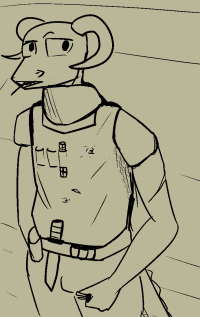
The Reclaimers make extensive use of the Vihnmes, either to rest at, while their Landcrawlers are in for repairs, or as a middleman to ensure that the nobles don’t mislead and underpay them for their services. Owing to the near-permanent presence of the Reclaimers, the Punished steer clear of all Vihnmes settlements.
Unathi from clan Vihnmes would generally work in: Cargo, Bartending, Counseling
Clan Ozeuoi - The Architects
“Whatcha need fixed?”
Strong and hardy, the Ozeuoi survive by pure ingenuity alone. What they lack in common sense and tact, they more than make up for in ability to cobble together scraps to create formidable creations. They live in relative seclusion from the other wasteland clans, owing to their overuse of turrets, traps and walls spanning miles of irradiated sand.
They make short work of Punished raids, by means of dispatching it before it even reaches their first set of gates. Not quick to make friends, but ultimately wanting to expand eventually, the Ozeuoi grow their numbers by recruiting retired Reclaimers, in exchange for handling the repairs of their massive Landcrawlers.
Unathi from clan Ozeuoi would generally work in: Engineering, Science
The Mi'kuetz
A band of K’lax, consisting primarily of Queenless Vaurca. They roam the Wasteland scavenging and surviving in the ruins of what once was Unathi kingdoms. They make use of a combination of Klaxan and Unathi gear. While they are Wastelanders, they practice the same tenets the Unathi of Moghes do. The Hegemony recognizes them, sometimes hiring them to do tasks that Sinta’Unathi cannot.
Due to their work in the wasteland and their population primarily being made up of Queenless, they do not have a specific coloration. However, they maintain the green tint the rest of their hive have, with some being darker and some being lighter in color.
History
These Vaurca were among the many to arrive at Uueoa-Esa. However, when the K’lax were vassalized by the Unathi, the need to have Queenless within the hive grew less and less, and more of them were resigned to live and work on Moghes, as part of an independent workforce.
As the Hegemony Unathi population viewed the K’lax in a negative light at first, a major case of discontent brewed within the ranks of the K’lax Queenless. Many banded together to their own communities, where games were played, social events were hosted, and police forces formed to self-govern the population.
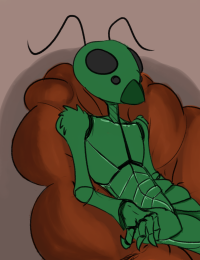
Eventually, they realized that life in the wastes might not be as bad as some of the Unathi have told them. When they ventured out into the wastes, they discovered that the inhospitable nature it holds towards Unathi affected them to a lesser degree. They quickly developed nomadic tendencies, and began calling themselves The Mi’kuetz.
Way of Life
In contrast to the minor oppression and difficulty these Vaurca faced in the past, their personalities are bright, cheery. They find it easy to connect to people, after the discomfort over the bug-like looks have passed. Workers have the best attitudes of the subtypes that exist. Happy-go-lucky, they work while singing tunes of custom-made songs praising the Queens and their community, derived from Unathi folk-music. Warriors are cocky, but good-natured. While they exude happiness and joy, their personalities do not interfere with their combat ability.
They are nomadic, roaming the wastes from site to site, in search of salvageable technology. They developed large bound that can be used as pack-animals, called the Vizk'tul. These bound are capable of holding many tents and supplies needed to survive on the wastes. They can also carry injured Mi’kuetz who are incapable of moving themselves. They find their use beyond what normal-sized bound can do by pulling large sleds. These sleds can contain a variety of useful things, a storage sled for transporting scavenged technology, or a mobile forge or kiln for working in the field. Some bound have large saddles upon which snipers and scouts perch to detect threats and possible scavenging sites. Their technology is catered primarily to their lifestyle. Their most well known to be a chemical substance engineered to burn in any environment, even underwater, much like Zorane Fire. This chemical is used in flamethrower-like weaponry, but can also be used to melt down scrap for recycling purposes.
Their food consists of genetically altered k’ois which does not spore when fully grown, but instead creeps along the surface of wherever it’s planted. While it cannot survive in the sands of the wasteland, the soil underneath contains enough minerals to allow farming. As farming while roaming is quite difficult, Mi’kuetz engineers developed soil beds that can be placed on top of traveling Vizk'tul.
Diplomatic Status
The Hegemony population grew to get used to the Mi’kuetz presence on their homeworld, but the Wasteland factions, with the exception of the Dorviza, tend to see them as intruders upon their lands, desecrating and salvaging ruins which are rightfully theirs. The Hegemony contracts these Mi’kuetz for jobs other Wastelander factions refuse to do, or Sinta’Unathi simply cannot do, due to environmental hazards or otherwise.
The Mi’kuetz also keep good relations with the main K’lax hive, having kept close contact with them even after venturing into the wastes. Their expertise are often sought by Klaxan chroniclers and researchers, who wish to learn more about Moghes and the technology that can be recovered to augment and advance their own.
They do not have a good relationship with the Aut’akh, as both factions have caught spies stealing technology from eachother, the Mi’kuetz being marginally more successful due to backing from the Hegemony. Some of these K’lax have been nicknamed Bunker Busters for their uncanny ability to penetrate Aut’akh dens, having remembered underground tunnel warfare doctrines from Sedantis.
Outside of Uueoa-Esa the Mi’kuetz aren’t very well known, but are recognized to be part of the K’lax hive. Nanotrasen and Hephaestus both are known to hire from this group, mainly as a way to find cheap labour to explore hazardous away sites.
| Unathi Lore Pages | ||
|---|---|---|
| Planets and Systems | Moghes · Ouerea · Uueoa-Esa · Notable Unathi Colonies · Gakal'zaal · Tret | |
| Factions | Izweski Hegemony · Unathi Guilds · Unathi Piracy · K'lax in the Izweski Nation · The Queendom of Sezk-Hakh · Free City of Vezdukh · Unathi in Dominia | |
| History | Unathi History · Contact War · Unathi Recent Events · Notable Unathi | |
| Religions | Sk'akh · Th'akh · Aut'akh · Si'akh | |
| Society and Culture | Unathi Entertainment · Unathi Honor · Unathi Military Structure · Unathi Crime And Enforcement · Unathi Educational Institutions · Unathi Spaceflight · Unathi Abroad · Zandiziite Games | |
| Regions of Moghes | Izweski Heartland · Tza Prairie · Southlands · Broken Coalition · Torn Cities · Zazalai Mountains · The Wasteland | |
| Lore Arcs | The Titan Rises Arc | |







